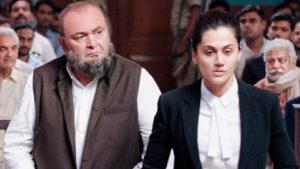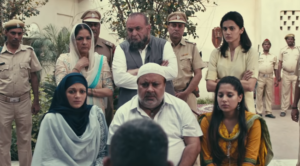‘Mulk’ deals with the nature of prejudice

By Sudha Kumar
Every once in a while a movie is made that makes one sit up and frown, question, think. MULK is one of those.
Director Anubhav Sinha has very courageously laid bare well known but rarely articulated facts that have in recent times become a normalised mindset. Perhaps a mindset that is prejudiced?
”˜Mulk’ (a nation) takes us through the journey of a Muslim family in contemporary India. A family that chose to stay in India during the partition of the country in 1947.

Two brothers ”“ one an educated practising lawyer who sports a beard and wears clothes typical of a Muslim man, the other a simple person who just makes do with a small shop of electronic goods, mobile phones and sim cards. Their wives ”“ one who chooses to wear a scarf and the other who doesn’t. The son of the older brother married to a Hindu girl, who has a great relationship with the whole family in spite of strains on the marital bond with her husband. The protagonist is played by Rishi Kapoor and well supported by Tapsee Pannu, Ashutosh Rana, Neena Gupta and Pratiek Babbar.
A nice picture of a moderate middle class Indian Muslim family of contemporary times. A family who loves, and is loved back, by the neighbourhood community, cutting across religion and class.
Then the younger brother’s son is radicalised, and lured into the ”˜jihadi’ web. He coordinates and commits a crime, as a result of which many lives are lost, and is killed in a police encounter.
The family is stunned. They are the last to know. They distance themselves from the idea of ”˜jihad’, the crime and the perpetrator in the most vehement and extreme way they know.
And as a fall out of this, the family is excluded, ostracised and shunned by all.
From that point the focus is on the court case where the brothers are charged with being involved in carrying out the crime.
What emerges out of the legal process however, runs deeper than just being a part of the narrative. It is a window to the biases and the prejudices that make our opinions; the stereotyping of behaviour and character based on appearances, clothes, traditions and religion. Also depicted are the power of the digital and social media as it spreads sensational bytes that further divides and sows anger and hatred methodically and effectively sparing none; the prejudice that allows one’s conscience to abuse power; the inability of parents (who are digitally illiterate) in today’s digital age to keep an eye on their growing children who have the world at their fingertips and in their pockets, and hence exposed to anything and everything; the strength of sense of belonging which goads the protagonist to fight for his right as a citizen and prove his innocence, and the lack of the same that radicalises the young nephew; the irresistible attraction of the marginalised young to the ideals of righteousness, courage and martyrdom even if its manifestation is hate, and expression is extreme violence and loss.
All of the above could apply to any one of us living in a secular multicultural society anywhere in the world, especially if one belongs to a minority. None of them have easy answers or solutions. Yet the acceptance that they exist is a first step towards changing mindsets that influence our opinions and behaviour and therefore our society.
Patriotism, defined as ”˜having or expressing devotion to, and vigorous support for one’s country’ comes naturally when your sense of belonging is well rooted. When that expression takes on an extreme form marked by superiority it becomes Nationalism. Its a thin line that separates the two. Nationalism feeds on the emotions of superiority, anger and violence, and somehow is validated because it is all for country. And therein lies the problem. With a history that dates back to 1AD, ”˜terrorism’ is a word that is emotionally and politically charged and has a violent manifestation. Throughout various periods of history across the world it has been used during political upheavals. It is not limited to a particular religion. Radicalisation, specially of youth, is a growing concern across the world in today’s times. Adults who work with adolescents and youth are learning to grapple with it. Studies have found that personal identity, marginalisation, racism and social exclusion can act as a catalyst for radicalisation and, potentially, violent extremism.
Stereotyping based on race, gender, ethnic background or religion is fast becoming more rampant and ”˜normal’. As long as laws are abided by, every citizen has the right to express his or her choice as much as another. When one citizen is asked to prove his identity and belonging by another it is a worry. And it is not ok.
It is time that we as a society and a people took pause.
Director Anubhav Sinha has been successful in portraying the opinion of the vast majority of the people who tend to be quiet and not vociferous in their expressions. These are the people who make up the fabric of our society and keep it healthy and robust. It is this vast majority, that come from both sides of the divide, that helps a society bounce back every time it is brought to its knees.
”˜Mulk’ is a thought provoking movie that voices many concerning universal questions.
And as I left the cinemas one of the statements that stayed with me was
”˜Terrorism is criminal not communal’. Indeed.
Short URL: https://indiandownunder.com.au/?p=11389
